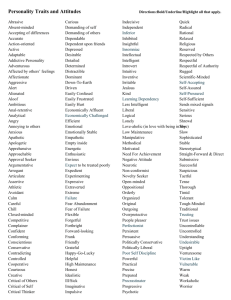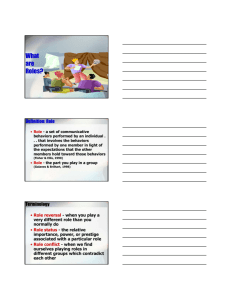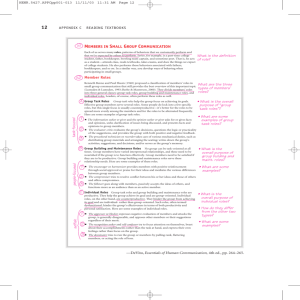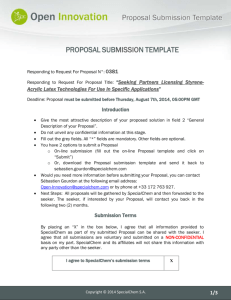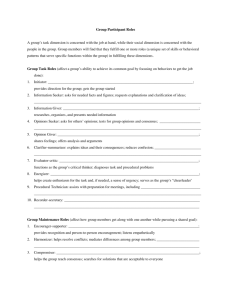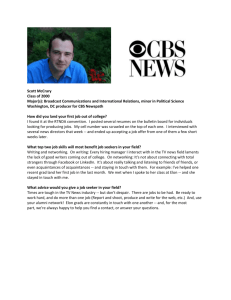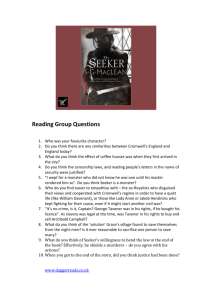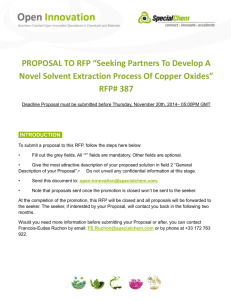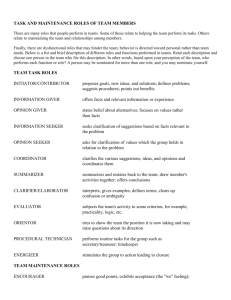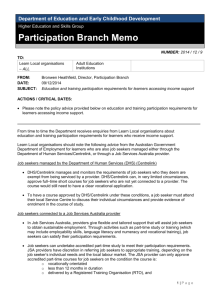DOCX file of Work for the Dole Host Induction Kit (0.9 MB )
advertisement
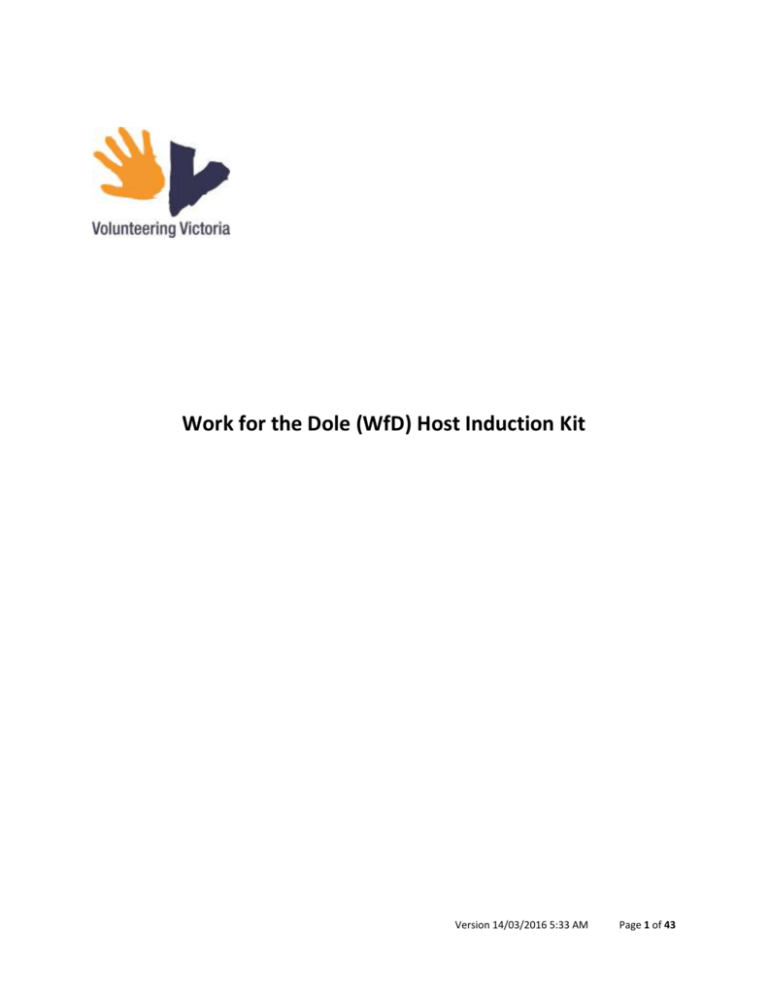
Work for the Dole (WfD) Host Induction Kit Version 14/03/2016 5:33 AM Page 1 of 43 TABLE OF CONTENTS 1 HOW TO USE THIS KIT .............................................................................................................. 3 2 INTRODUCTION TO WORK FOR THE DOLE (WFD)..................................................................... 3 3 GENERAL INDUCTION GUIDELINES FOR HOSTS ........................................................................ 4 4 PREPARING FOR THE JOB SEEKER............................................................................................. 5 4.1 Responsibility of the jobactive provider ......................................................................................................... 5 4.2 Responsibility of the WfD Host ....................................................................................................................... 5 5 OVERVIEW OF THE INDUCTION MEETING ................................................................................ 6 5.1 At the beginning of the meeting ..................................................................................................................... 6 5.2 During the induction meeting ......................................................................................................................... 7 5.3 At the end of the induction meeting .............................................................................................................. 7 6 THE INDUCTION PROGRAM...................................................................................................... 8 6.1 About the Host ................................................................................................................................................ 8 6.2 About the activity............................................................................................................................................ 9 6.3 About the job seeker....................................................................................................................................... 9 6.4 Rights, responsibilities and legal issues ........................................................................................................ 10 6.5 Host’s policies and procedures ..................................................................................................................... 14 6.6 Use and care of property, equipment & information ................................................................................... 15 6.7 Appropriate dress .......................................................................................................................................... 17 6.8 Drugs, Alcohol and Smoking ......................................................................................................................... 18 6.9 Conflict management .................................................................................................................................... 19 6.10 Behaviour .................................................................................................................................................... 19 6.11 Fun stuff ...................................................................................................................................................... 20 6.12 Ongoing communication ............................................................................................................................. 21 6.13 What to do if… (scenarios) .......................................................................................................................... 21 6.14 Meet and greet ............................................................................................................................................ 22 Attachment 1: Emergency Contact Details ............................................................................................................ 23 Attachment 2: Host Contact Details ...................................................................................................................... 24 Attachment 3: Leave Request Form ...................................................................................................................... 25 Attachment 4: Pre Induction Checklist (host to complete) ................................................................................... 26 Attachment 5: Induction Checklist (host and job seeker to complete during the induction meeting) ................. 27 Attachment 6: About Volunteering ....................................................................................................................... 28 Attachment 7: Incident/Hazard Report ................................................................................................................. 30 Version 14/03/2016 5:33 AM Page 2 of 43 1 How to use this kit The information provided in this kit is generic – it is designed to apply to a wide range of Work for the Dole (WfD) Hosts and WfD activities within each Host organisation. Each Host will need to provide additional information specific to their organisation, activity and/or job seeker – throughout this document we have indicated where the Host should include additional information. The purpose of this kit is to: 2 Assist WfD Hosts with the smooth induction of job seekers into their WfD activity. Ensure WfD job seekers receive essential information critical to the success of their placement. Benefit both the job seekers and Hosts by ensuring both parties have a common understanding of their respective rights, responsibilities and expectations. Enable Hosts to tailor the induction to: o suit their specific needs and the requirements of the activities to be undertaken by the job seekers. o identify and address the particular needs of the job seekers that they are hosting. Complement the information given by jobactive providers to job seekers and Hosts prior to the commencement of placements. Introduction to Work for the Dole (WfD) jobactive is the new employment services system that commenced on 1 July 2015 to replace Job Service Australia. Under this system, WfD coordinators will source suitable WfD places, and jobactive providers will support job seekers to complete WfD and help them find a job. Most job seekers who have Mutual Obligation Requirements (e.g. people on Newstart or Youth Allowance and people on Parenting Payment whose youngest child is aged over six years) will need to: Undertake up to 20 job searches per month. Enter into a Job Plan that will outline what they will do to satisfy their mutual obligation requirements. Complete WfD for six continuous months each year (or another approved activity such as parttime work or part-time study). o Job seekers aged under 30 years will typically need to complete activities for 25 hours per week for six months each year. o Job seekers aged 30-49 years will typically need to complete activities for 15 hours per week for six months each year. o Job seekers will receive a supplement of $20.80 a fortnight while they are completing WfD to assist with the cost of participating, such as transport. Job seekers who have a partial capacity to work or are principal carer parents will have a parttime Mutual Obligation Requirements. The extent and combination of activities that these job Version 14/03/2016 5:33 AM Page 3 of 43 seekers can undertake will vary, depending on the requirements for different job seeker cohorts. WfD is intended to benefit job seekers by placing them in supervised ‘work-like’ activities that will improve their employability by: Helping them gain the skills and work experience employers want. Enhancing their ability to work independently or as part of a team. Improving their communication skills. Increasing their confidence and motivation. Demonstrating they are dependable and work-ready. Building networks and contacts who can provide leads on job opportunities or references when applying for a job. In addition, a successful WfD placement can help build job seekers’ sense of self-worth, and social and civic engagement. 3 General induction guidelines for Hosts The purpose of the induction is to provide WfD job seekers with information that will help them be successful and effective in their placement. At a minimum, the induction should include information about: The Host, including its purpose, structure, key personnel, activities, policies and practices. The activity and specific tasks the job seeker will be undertaking. The job seeker’s role, rights and responsibilities. Job seekers play a key role in making the most of their placement opportunity. However, to maximise the chances of a successful placement, Hosts also have a responsibility to appropriately plan for the placement, and to properly induct and supervise job seekers – just as they would for paid staff and volunteers. Hosts are encouraged to make contact with job seekers before their placement commences to: Introduce themselves to the job seekers and make them feel welcome Check that job seekers have all the information they may need to prepare for the first day of their placement, including: o how to get to their place of work o what time to arrive and who they should report to on arrival o any special clothing, equipment or other things they might need on their first day. Hosts should liaise with their jobactive provider about the best way to contact job seekers or provide this information to them. Version 14/03/2016 5:33 AM Page 4 of 43 The chance of a successful WfD placement can be enhanced by providing a mentor or ‘buddy’ to support the job seeker with on-the-job advice. This is particularly important for those people who have limited work experience. The ideal mentor or buddy is a peer (rather than a supervisor) who is approachable, patient and a good communicator. 4 Preparing for the job seeker 4.1 Responsibility of the jobactive provider Prior to the placement of a WfD job seeker with a Host, it is the jobactive provider’s responsibility to: Complete the Job Plan with the job seeker. This Plan records the activities the job seeker must undertake to satisfy their Annual Activity Requirement and their Mutual Obligation Requirements (e.g. job searches and appointments). Complete the Activity Host Organisation Agreement with the Host organisation. Conduct a risk assessment (job seeker) and examine the risk assessment (place) that was conducted by the WfD coordinator to ensure the place is appropriate for the particular job seeker, taking into account any relevant personal circumstances and work restrictions. This includes, but is not limited to appropriate and adequate: o training and supervision o personal protection equipment and clothing o on-site facilities, such as access to drinking water and toilets o information on the process for reporting any work health and safety issues and other concerns, including escalation to the jobactive provider if required. Ensure that relevant checks (e.g. criminal records checks and working with vulnerable people checks) have been finalised. Manage the job seeker during the WfD place. This includes: o monitoring attendance and reporting on compliance by the job seeker o ensuring the job seeker continues to focus on looking for work as well as participating in WfD. job seeker compliance with their Mutual Obligation Requirements in the Department’s IT System, specifically appointments and activities. Providers must ensure that the Activity supervisors are aware of their responsibilities to inform, using agreed methods, their jobactive provider where a job seeker does not attend their activity, or where there is noncompliance, as soon as it is practical. Providers may also include a Clause within the Activity Host Organisation Agreement which requires Activity supervisors to inform them where a job seeker does not attend their activity or any participant performances issues. 4.2 Responsibility of the WfD Host To help ensure a successful WfD placement, a Host should: Version 14/03/2016 5:33 AM Page 5 of 43 5 Ensure that the WfD place does not displace paid workers. This is a compulsory requirement and additional information on displacement is covered in clause 2 of the template Activity Host Organisation Agreement. Prepare an induction program that is relevant to the needs of the job seeker and the activity and tasks they will be undertaking. Consider if it is necessary to split the induction over more than one session so that it is not too overwhelming. Prepare an Induction Workbook for the job seeker to take notes and take away from the induction meeting. The Kit should include essential information about the Host and the WfD activity. Consider how the induction will be conducted and what resources or tools might be used to ensure it is engaging and interactive (e.g. print, online materials and face-to-face presentation). Identify other people who should be involved in all or part of the induction (e.g. the job seeker’s supervisor or on-the-job mentor/buddy). Prepare the job seeker’s workplace. This might include: o Prepare any specific requirements for job seeker with additional support needs. o Identify and organise any activity-specific training requirements. o Ensure workplace colleagues are notified and briefed to welcome to job seeker as a new team member. o Prepare an induction checklist that covers all essential components of the induction program. This will help remind the Host about what they need to cover in the induction, and remind the job seeker what they have been told. A sample Host Checklist is provided as Attachment 4. o Prepare a schedule of activities for the first week of the job seeker’s placement. Overview of the induction meeting Ideally the induction should be a conversation, not a simply a one-way presentation or lecture. It is important to provide opportunities for the job seeker to ask questions, to enable them to check their understanding, to identify any concerns they might have and to talk about their aspirations for their WfD placement or future work. To encourage interaction, ask open-ended questions, not closed questions that might only result in a ‘yes’ or ‘no’ answer. WfD job seekers have a wide variety of life and work experiences, and the Host’s recognition of and response to this can make or break the success of a placement. An induction designed for a mature age job seeker with work experience, should be different to that of a younger job seeker with limited or no work experience. 5.1 At the beginning of the meeting The job seeker may have some doubts or nerves about this initial meeting, so aim to establish an informal, welcoming and friendly tone. Version 14/03/2016 5:33 AM Page 6 of 43 Welcome the job seeker, shake their hand and introduce yourself (name, title, and role). Offer the job seeker refreshments. They may have travelled some distance and may not have eaten. Explain the purpose of the induction meeting is to ensure the job seeker has all the information they need to know about the Host and the activity to help make their placement successful – this information includes their rights, responsibilities and what to expect in the role. Assure them it is not an interview or a test of their skills or abilities, and if they perform the activity as outlined, their placement is more likely to go well. Confirm with the job seeker they are able and encouraged to ask questions at any time. Provide a copy of the Job Seeker Induction Workbook and a pen for the job seeker to take notes and to take away. Explain they might want to refer to their notes during their placement. 5.2 During the induction meeting Step through the induction systematically, using the Induction Checklist (Attachment 5) as a guide, to ensure no important information is missed. Encourage the job seeker to talk about relevant skills or their previous experience with specific topics identified in the checklist. Complete or check any paperwork together, including information provided by the jobactive provider or paperwork required by the organisation (e.g. emergency contact details). This is particularly important if the job seeker has limited literacy or English language skills. It might also prompt discussion on any issues or challenges that could impact the job seeker’s ability to successfully undertake the activity. Be aware of the job seeker’s body language – are they looking uneasy, disengaged or confused? 5.3 At the end of the induction meeting For job seekers with limited employment experience, reassure them that all new jobs can be tiring and a little overwhelming at first - there can be a lot to learn. Also stress that most jobs have less interesting components - this is a reality of work. Ask the job seeker if they have any questions, or require clarification about any aspect of their activity, the organisation, or their rights and responsibilities. Prompt them if you feel they would like to ask something. Complete the Induction Checklist (Attachment 5) together and provide a copy to the job seeker – it can be a useful reminder for them about important information related to their placement. Take the job seeker for a tour of their workplace and introduce them to their colleagues (staff, volunteers and other WfD job seekers). Introduce them by their name and role – not as a WfD job seeker. Thank the job seeker for their time and confirm they are viewed as a valuable and welcomed addition to the organisation. Version 14/03/2016 5:33 AM Page 7 of 43 6 The induction program Following are key components that should be included in an induction program. In addition to standard generic information, there will also be information each Host will need to include that is specific to each Host, activity and job seeker. 6.1 About the Host Aim: to ensure the job seeker has sufficient information about the Host to make a positive contribution and to undertake their role successfully. Explain the nature and purpose of the Host organisation, for example: Whether it is a not-for-profit, local government authority or other type of organisation. Why it exists, its main activities, programs, services or products. Who are its clients or customers and other stakeholders. Its values and expectations of the people working for it in any capacity. The number of people who work in the organisation and who are they (staff, volunteers and other WfD job seekers). o If there are staff and volunteers working in the organisation, explain their respective roles. o Explain the difference between volunteering and the arrangements that apply to WfD. Refer to Attachment 6, About Volunteering. To build rapport and understanding, ask the job seeker if they have experience with or awareness of the organisation or any similar organisation. Provide details of the job seeker’s on-the-job colleagues and key contacts, including their supervisor. Ideally some of these people will participate in or be introduced during the induction program. Provide information about the job seeker’s place of work, for example: The location of important facilities, such as the staff room, kitchen, sick-bay, showers and toilets. Site location/s and layout (provide a map if required). Public transport and parking. Ask how the job seeker travelled to work on their first day and whether they found it easy and convenient. This question might uncover difficulties for the job seeker that could impact their placement. Local shops, including places to buy food, banks, post office etc. Provide information about the organisation the job seeker can read at their leisure, (e.g. an annual report, newsletter, organisational chart or marketing material). Version 14/03/2016 5:33 AM Page 8 of 43 6.2 About the activity Aim: to ensure job seeker has clear understanding of what they are expected to do. Outline the activity and tasks the job seeker will be doing, including what they might expect to do on a ‘typical’ day or week. Discuss: How the job seeker’s work supports the Host’s purpose. What success in the placement might look like – for the Host and for the job seeker. The specific or typical tasks they may be required to undertake to complete the activity. Ask the job seeker whether they have undertaken similar tasks in the past. If so, what they found most rewarding and challenging. If not, what additional support they believe they might need. Any training, resources and tools required to undertake the activity. Who they might be working with and their respective roles and responsibilities in relation to the activity. The job seeker’s limits of responsibility – what decisions they can and cannot make, and when they should seek the guidance of their supervisor. What constitutes a reasonable work load and their course of action if they are not coping with the work load. The job seeker’s days and hours of work. Ask the job seeker if they foresee any difficulty working these days and hours. When, how frequently and for how long they are entitled to take breaks. 6.3 About the job seeker Aim: to build rapport and effective communication between the Host and job seeker Have a general discussion about: What the job seeker is hoping to get out of their placement. The job seeker’s aspirations for future employment. Any uncertainties they might have about the activity, specific tasks or their placement. Potential challenges or barriers for the job seeker in meeting the requirements of the placement (e.g. travel to/from work or family commitments) How the job seeker will manage their other Mutual Obligation Requirements during the placement (e.g. meetings with their jobactive provider, job searches, attending Centrelink appointments, being available to take calls from prospective employers and going to job interviews). Share information about what other job seekers have said about their WfD placement. This might include:1 o The project has given me confidence that I can go out and get a job. 1 Nevile, A and Nevile, J.W (2005), Centre for Applied Economic Research Working Paper (2005/05) Realising the Potential of Work for the Dole, University of New South Wales, Sydney at pp 19-20. Version 14/03/2016 5:33 AM Page 9 of 43 o o o o I’ve become more confident in this placement. Before I didn’t feel comfortable using the telephone - I would get embarrassed if someone walked into the room while I was on the phone. I was given help with that and now I am fine. I didn’t initially want to do WfD, but it does get you out of bed in the morning and keeps you on a level - less depressed. At least I am learning something. I have learnt patience and how to deal with other people. I have learnt to deal with conflicts and disagreements. I think this project will help me get a job because of the experience of working in a team, working with different people. 6.4 Rights, responsibilities and legal issues Aim: to ensure the job seeker understands their rights and responsibilities in the workplace. All workers, including WfD job seekers, have rights and responsibilities in the workplace. Some of these rights and responsibilities are enshrined in Commonwealth, State or Territory legislation, others are simply good practice. While too much information about legal matters is likely to be overwhelming and more than any job seeker needs to know to undertake their placement, its useful for them to understand when there is a legal underpinning to their rights and responsibilities. The information provided below is designed to provide a Host with background for general discussions with the job seeker about some of the key issues. In all instances, you should: Reassure the job seeker that WfD job seekers will be given the same level of protection as paid staff and volunteers. Any job seeker who feels they have been treated inappropriately is encouraged to raise the issue. For example: o (Where it is possible and safe to do so) they could tell the person responsible for the behaviour that it is unacceptable. o They could raise their concerns with their supervisor, or if the issue is with the supervisor they could raise their concerns with the supervisor’s manager. All notifications or complaints by job seekers will be taken very seriously and dealt with in accordance with the relevant policies and procedures of the Host (e.g. Grievance Procedure or Occupational Health and Safety Procedure). The Department has published a Health and Safety Factsheet for Host Organisations and Job seekers. This can be found on the Department’s website, or a copy obtained from your local jobactive provider. Any form of non-compliant behaviour by job seekers will be viewed seriously and will not be tolerated. If proven, appropriate action will be taken. Depending on the seriousness of the matter, this may include termination of the WfD placement. The Host also reserves the right to notify the police of any conduct that may also be a criminal offence. 6.4.1 Respect Everyone is entitled to be spoken to and treated with respect. Version 14/03/2016 5:33 AM Page 10 of 43 6.4.2 Discrimination Discrimination can include the unfair or unequal treatment of an individual on the basis of one or more of a number of attributes, including: Age Disability Industrial activity or inactivity Lawful sexual activity Physical features Parental status or status as a carer Gender Sexual orientation Gender identity Marital status Religious belief or activity Race Pregnancy or potential pregnancy Breastfeeding Political belief or activity Personal association with a person who is identified by reference to any of the above attributes Making a reasonable request for information about employment entitlements (employment activity). 6.4.3 Sexual harassment Sexual harassment is: An unwelcome sexual advance. An unwelcome request for sexual favours. Any other uninvited, unwelcome behaviour of a sexual nature in circumstances in which a reasonable person would have anticipated that the other person would be intimidated, humiliated or offended. Sexual harassment can be physical, verbal, written or other conduct. It can be a single incident or repeated behaviour. 6.4.4 Bullying Bullying is repeated, unreasonable behaviour directed toward an individual or group of people that creates a risk to health and safety. Bullying may be intentional or unintentional. Such behaviour can be carried out in person, by email, text, social media or other means, and may extend beyond normal work hours. Some example of bullying include: Version 14/03/2016 5:33 AM Page 11 of 43 Abusive or aggressive behaviour. Belittling or humiliating comments. Teasing or practical jokes. Spreading malicious rumours. Pressuring someone to behave inappropriately. Excluding someone from work-related events. However, reasonable management action carried out in a reasonable manner is not bullying. For example, supervisors are entitled to: Allocate work and set performance goals, standards and deadlines. Inform and warn job seekers about unsatisfactory work performance or inappropriate behaviour. 6.4.5 Victimisation Victimisation is subjecting (or threatening to subject) a person to any detriment because that person (or a person associated with that person) has exercised (or intends to exercise) their rights under equal opportunity laws or the Host’s grievance procedure. 6.4.6 Violence Violence is behaviour (often with criminal implications) that recklessly or intentionally causes injury or potential injury to another person, or conduct endangering life. It can be a single, opportunistic or random event or it can be ongoing, persistent and/or premeditated. It can be perpetrated by individuals within or outside the Host. 6.4.7 Health and safety The Host’s responsibilities Workplace health and safety must be taken very seriously. It is the responsibility of all Hosts to provide and maintain (so far as is practicable) a working environment that is safe and without risks to health including: Making and monitoring arrangements for the safe use and handling of equipment. Maintaining the work place in a safe and healthy condition. Providing adequate facilities and equipment to protect the welfare of job seekers. Providing information, training and supervision for job seekers enabling them to work in a safe and healthy manner. Maintaining information and records relating to job seeker’s health and safety. The Host undertakes to: Version 14/03/2016 5:33 AM Page 12 of 43 Ensure agreed health and safety procedures are in place and are followed. Make regular assessments of health and safety performance and resources. Ensure that all specific health and safety procedures are operating, periodically reviewed and are consistent with health and safety best practice. Provide information, training and supervision for all job seekers in the correct use of equipment. Have a process in place to ensure that they are informed of incidents or accidents occurring on their premises, or to job seekers in the course of their duties. Notify the jobactive provider as soon as possible, and within 24 hours, of any incident involving a WfDe activity. iIncident report form templates for use by Host organisations is provided at Attachment 7 and 8. The Host’s Health and Safety Manager, or equivalent, is the person responsible for the implementation and monitoring of health and safety processes at this Host. Job seeker responsibilities The Host seeks cooperation from job seekers to create a safe working environment. It is the responsibility of everyone, including job seekers, to: Exercise reasonable care and diligence. Comply with all health and safety procedures and directions. Be vigilant and look out for the health and safety of themselves and others. Act to remove (where safe to do so) or report any situation, which is or may be a health or safety hazard. Not willfully interfere with or misuse items or facilities provided. Participate in health and safety training and exercises as directed. 6.4.8 Privacy In general terms, personal information is any information that can be used to personally identify you. This may include your name, address, telephone number, email address and profession. The Host’s responsibilities The Host may only use or disclose personal information about a job seeker to their jobactive provider and the Department for the purposes of performing the Activity Host Organisation Agreement, including information relevant to: Ensuring there is a safe system of work at the place Proposed changes in circumstances or tasks being undertaken by the job seeker Version 14/03/2016 5:33 AM Page 13 of 43 The performance of the activity The occurrence of any incident involving a job seeker The eligibility of a job seeker to receive a benefit or payment. The Host must not use or disclose personal information about a job seeker for any other purpose, unless the job seeker has provided written consent, or it is otherwise permitted by the Privacy Act 1988 (Cth), including where it is required or authorised by law. Additional information on privacy is covered in clause 8 of the template Activity Host Organisation Agreement. Job seeker responsibilities Job seekers must comply with applicable legislation, and the Host’s privacy policies and procedures in relation to personal information about other people that they have access to during their placement (e.g. information about the Host’s clients, suppliers, contractors, paid staff, volunteers or other job seekers). 6.5 Host’s policies and procedures Aim: to provide an overview of the Host’s policies and procedures that are relevant to the job seeker’s placement. Many Host organisations will have policies and procedures relating to general rights, responsibilities and legal issues (covered in the previous sections): Respect Discrimination Sexual harassment Bullying Victimisation Violence Health and safety Privacy. Many Host organisations will also have policies and procedures that relate to the specific requirements of the Host (key policies are covered in the following sections): Use of facilities Use of social media, mobile phones and other personal devices Use of computers and related equipment Internet use Intellectual property Appropriate dress Use of prescribed drugs Use of alcohol or illegal drugs Version 14/03/2016 5:33 AM Page 14 of 43 Smoking Conflict management. In addition, the Host should discuss with the job seeker any policies or procedures they have about the following topics, if applicable: Security, including restricted access, use of keys or passes, care of valuables. Emergency procedures, including evacuation, in the event of a fire or other potential risk. Discipline and grievance procedures. Work related expenses and reimbursements. Money handling policies, including petty cash. Work related travel. Information on where job seekers should leave their valuables. Time-keeping, including punctuality, breaks, departure. Absences, including sick leave (including requirements for medical certificates), late arrival or early departure. Unfitness for work. Early exit from the placement. Appropriate documentation for any of the above. 6.6 Use and care of property, equipment & information Aim: to confirm the appropriate use of the Host’s property, equipment and information, and the job seeker’s use of the internet, email, social media and mobile phones in the workplace 6.6.1 Facilities Provide a list of the facilities available for the use of the job seeker. These facilities might include: toilets, showers, staff room, kitchen, parking, bike storage, sick-bay etc. Advise (and show) the job seeker the location of these facilities, and how and when they can be accessed. This might include off-site facilities, after-hours access, security, keys, whether the facilities are also used by the public etc. Advise the job seeker of any expectations regarding the use of the facilities, for example, cleanliness, tidiness and reporting damage. If there is a charge for the use of any facilities, consider waiving the charge for job seekers (and volunteers) given they are not being paid by the Host. 6.6.2 Use of social media, mobile phones and other personal devices Explain the appropriate use of mobile phones and other personal devices in the workplace, especially their use during prescribed work hours and in meetings. For example, phones should be turned-off or Version 14/03/2016 5:33 AM Page 15 of 43 put on silent. Allowances should be made if the job seeker is expecting a call related to their WfD placement or for a job interview. Explain the appropriate use of social media. For example: It should not be accessed on the job seeker’s own personal devices during prescribed work hours, except during breaks. It should not be accessed on the host’s equipment, unless it’s a required task of the activity or with the express permission of the job seeker’s supervisor. Inappropriate language, comments, photos or other material on social media about the host, colleagues or the job seeker’s placement will not tolerated. Permission should be sought before posting any images of colleagues or clients at any time. 6.6.3 Use of computers and related equipment Where required, computers and related equipment will be provided to enable the job seeker to fulfil their role efficiently and effectively. All equipment should be used responsibly, legally and for its intended purpose and, as a general rule, should not be used for personal use, unless express permission is given by the job seeker’s supervisor. Job seekers are required to: Comply with all relevant policies including, but not limited to privacy, website use and social media. Properly handle and maintain their equipment and promptly report any equipment damage or malfunction. In the case of mobile equipment, such as a laptop, ensure it is secure from damage or theft. 6.6.4 Internet use Explain that the host has a right to monitor internet or email activity occurring on the Host’s equipment and that inappropriate use of the internet or email will result in appropriate action. The job seeker must: Comply with applicable policies and procedures regarding the use of the internet. Comply with applicable local and national laws. Not attempt to gain unauthorised access to the Host’s information and resources. Not disrupt the intended use of host’s internet or email services. Not destroy the integrity of or misuse any host information assets. Not compromise the privacy of any users. Not compromise Host sensitive information and or intellectual property. Version 14/03/2016 5:33 AM Page 16 of 43 Not use host computers to access online games, chat rooms, dating sites, social networking, gambling or pornographic/sex websites. Must not surf topics relating to sex, drugs or other inappropriate material. Not use the internal email system for idle chatter or to spread rumours 6.6.5 Intellectual property (IP) IP is a term that describes the application of the mind to develop something new or original. IP can exist in various forms – the most well-known are things like new inventions, designs or artistic creations. In the context of WfD placements, IP might include things like writing a document, designing a webpage, making system improvements or a recipe. The Host has the right to determine the use of and to protect IP (and other know-how) developed in work-time and/or with organisational resources. The moral right of the developer of that IP may be recognised, depending on the Host policy. For instance: The name of the job seeker might be listed as a contributor to a report, listed on a menu or thanked at an event. The removal or unauthorised use of organisational property (including IP) by a job seeker is generally prohibited. However, some Hosts may be stricter on this requirement than others. If the IP relates to the development of a professional portfolio by the jobseeker, the job seeker may be able to seek express permission to copy or use IP developed during the placement. Host to give examples of their organisation’s IP policy. 6.7 Appropriate dress Job seekers are expected to dress appropriately for the placement. This might include: Wearing a uniform or protective/safety clothing and footwear if required for the activity or a particular task. Dressing appropriately for the weather if working outdoors. Ensuring clothes are clean, neat and modest (no short shorts, bare midriffs etc.) Ensuring footwear is clean and appropriate for the activity. Identify the type of footwear that should not be worn in the workplace, for example, thongs. Hair being clean and neat. For some tasks (food handling use of equipment) hair may need to be tied back or a hairnet/cap worn. Facial hair being clean and neatly trimmed. Body odour being minimised with regular washing and use of deodorant. Teeth being cleaned. Wearing a name badge if is provided and required by the Host. Host to add if there is any specific requirements regarding tattoos, jewelry, etc. Version 14/03/2016 5:33 AM Page 17 of 43 6.8 Drugs, alcohol and smoking Aim: to ensure the job seeker understands Host’s policy and related legal issues in relation to drugs, alcohol and smoking. 6.8.1 Use of prescribed drugs It is the responsibility of all staff, including job seekers, who are taking a prescribed medication to: Take that medication in accordance with its intended use. Be aware of any possible side-effects related to the taking of that drug. Advise their supervisor if the drug or its side-effects are likely to impact their ability to do their job. It is the responsibility of the Host to: Ensure a safe work environment for all job seekers on prescribed medication and for their colleagues. Assign the job seeker to alternative tasks if the supervisor believes the job seekers ability to do their job safely is impacted by their prescribed medication. 6.8.2 Use of alcohol or illegal (unprescribed) drugs Job seekers must present to work in a fit state for work and not be affected by alcohol or illegal drugs, or in any other way be unable to perform their assigned WfD tasks. Job seekers who are unable to safely perform their activities, will be deemed ‘unfit for work’ and asked to leave until they are fit and it is safe for them to work. It is a criminal offence to use, possess or deal in any illegal drugs or other controlled substances. Job seekers found to be involved in any illegal activities involving drugs during their placement will be subject to disciplinary action, including possible termination of the WfD placement. The Host also reserves the right to notify the police. *Explain the organisation’s policy on acceptable alcohol use, including whether the organisation has a zero tolerance approach to alcohol. Some organisations may allow alcohol to be consumed on special occasions and then only in moderation. 6.8.3 Smoking Smoking is prohibited on the Host’s premises* and all job seekers must observe the no smoking policy at all times. A breach of this policy may result in the Host taking disciplinary action. *Identify any designated smoking areas and outline expectations regarding the disposal of butts and the frequency of smoking breaks. Version 14/03/2016 5:33 AM Page 18 of 43 6.9 Conflict management Conflicts may arise with paid staff or volunteers, other job seekers, or with a customer or service user. Tension may arise naturally through different individuals carrying out their respective activities. For example: A finance person may be employed to prevent and control too much expenditure, while an events manager may be employed to spend money on hospitality for attendees. A customer seeks to change a product they purchased, which if not faulty, may be going beyond their legal right for a refund or return. Job seekers need to be able to appreciate the requirements and constraints of other roles in the organisation when undertaking their own activities. Where relevant, they must comply with the Host’s policies. Conflict may also arise due to different personalities, worldviews and opinions of people in a work place. Some forms of conflict are controlled through legislation (see earlier sections on legal issues such as discrimination, sexual harassment and bullying). However interpersonal conflict is not necessarily a ‘legal’ issue. Job seekers have the same rights and responsibilities as other staff regarding the avoidance and effective management of interpersonal conflict. Job seekers are encouraged to be courteous with colleagues and to be assertive, not aggressive or unnecessarily subservient, when dealing with different points of view. Discuss with job seeker the potential sources of conflict in the role. Review the policies and procedure that are relevant to managing tensions or conflicts in the activity. Identify cultural attributes of the workplace (such as the extent of hierarchical authority in decision-making or the sense of humour that drives the culture) and suggest behaviours that will enhance the avoidance and management of conflict by the job seeker. 6.10 Behaviour Aim: To ensure the job seeker understands what is acceptable behavior in the workplace. Explain to the job seeker that a certain standard of behavior is expected of all personnel (paid staff, volunteers and WfD job seekers) in the workplace. Many of these have been discussed in detail in earlier sections. Following is a checklist of relevant behaviours: Complying with legal requirements and good practice standards (see earlier sections). Complying with Host policies and procedures (see earlier sections). Using appropriate language (e.g. no swearing). Version 14/03/2016 5:33 AM Page 19 of 43 If the job seeker is unable to attend their activity they should call their jobactive provider and Host organisation ahead of time to let them know why. o If the job seeker has a valid reason for non-attendance the jobactive provider will record this and no further action may be taken. Your jobactive provider will discuss with you the options available to make up any (if required) hours you may have missed in your activity. o If the job seeker does not have a valid reason for non-attendance, the jobactive provider will record this and may apply the job seeker compliance framework, including reporting the non-attendance to the Department of Human Services. Only use prescribed drugs and advise supervisor if this will affect your ability to do the job (see earlier section). Come to the activity sober and do not use alcohol or illegal drugs at work (see earlier section). Adhere to smoking/no smoking requirements, including breaks, where/when smoking is allowed or prohibited (see earlier section). Handle money according to organisational policy. Eat and drink in designated areas. Review Host requirements regarding, for example, eating at the desk or in public areas, drinks near computer keyboards, etc. Creating positive relationships/interactions with others in the workplace. The job seeker should: o Observe principles of courtesy, fairness, equity and sensitivity in all dealings. o Behave with due regard to duty of care in all relationships and dealings with others. o Observe the rights of all colleagues and members to respect, dignity, privacy, and protection from harm or abuse. o Behave in accordance with Host policies, processes and guidelines and keep up to date with changes that may occur from time to time. The Host will ensure that all staff and job seekers are notified of changes to policy, process or guidelines as changes occur. o Not harass or make sexual advances towards others. o Not engage in unlawful discrimination, harassment, bullying or violence against anyone in dealings on behalf of the Host. Job seekers are expected to be a good representative of the Host organisation and meet general standards of workplace behaviour and presentation. 6.11 Fun stuff Aim: To help the job seeker integrate into the workforce, helping making the placement more successful. Many Host organisations provide occasional opportunities for staff and volunteers to engage socially. This can be important to help build rapport and a sense of team. Typical social activities might include: Social club. Sporting activities, like fun runs and bowling. Lunches, morning and afternoon teas. Version 14/03/2016 5:33 AM Page 20 of 43 After work activities, like film nights and weekend family events. Job seekers should be encouraged to participate in social activities. If there is a cost involved, consider paying for the involvement of job seekers (and volunteers) given they are not being paid by the Host. 6.12 Ongoing communication Aim: Schedule regular catch-ups/meetings to check progress, well-being and to identify any challenges/issues before they become overwhelming. Frequent catch-ups are important, particularly when the job seeker first starts at the Host. Ensure a quiet and private space is available and the meeting is not rushed. Set the scene of a positive environment, by praising what has gone well, asking the job-seeker for their views on the placement so far, then giving any feedback in a constructive and specific manner. Any agreed actions should be documented. 6.13 What to do if… (scenarios) Aim: To ensure the Job seeker has understood critical/important aspects of their induction. Following are examples of scenarios that might be applicable. Ask the job seeker the following questions. Confirm this is not a test or an attempt to catch the job seeker out, but an opportunity to check understanding and, if required, to reinforce messages. The correct answers have been underlined. Q1 You are held up and will be late for work by about ten minutes. Do you: a) Sneak into work – you are only ten minutes late and no one will notice. b) Phone your Host to explain that you are running late and when you expect to arrive. Q2 A colleague regularly makes offensive comments under their breath. Do you: a) Speak to your supervisor about this inappropriate behaviour. b) Keep it to yourself because no one will do anything about it anyway. Q3 You are waiting for a call about a job interview. Do you: a) Put your phone secretly in your pocket and keep checking it without your supervisor knowing. b) Explain to your supervisor and ask to keep your phone with you and turned on. Q4 You are unsure how to do a task. Do you: a) Ask your supervisor for guidance and check back with them to ensure you have completed the task correctly. Version 14/03/2016 5:33 AM Page 21 of 43 b) Try your best and muddle through, hoping for the best, because you think you should know what to do by now. Q5 You see something potentially dangerous in your workplace e.g. loose cables across a walkway. Do you: a) Leave it to the others to notice – you don’t want to be thought of as whinging. b) Immediately tell your supervisor. 6.14 Meet and greet Aim: To show the job seeker where they will be working and to introduce them to those they will be working with, to help them feel included. Introduce the job seeker to the people they will be working with, perhaps over morning/afternoon tea. Show them around the site they will be completing their activities at, including kitchen, toilets etc. Version 14/03/2016 5:33 AM Page 22 of 43 Attachment 1: Emergency Contact Details Name of job seeker (first name/last name) ________________________________________________ Mobile (or home) telephone number of job seeker __________________________________________ Address of job seeker Unit Number (if applicable) ______________________________________________________________ Number and Road Name ________________________________________________________________ Suburb ______________________________________________________________________________ State _________________________________ Postcode ____________________________________ Name of emergency contact (first name/last name) _________________________________________ Relationship to job seeker ______________________________________________________________ Address of emergency contact Unit Number (if applicable) ______________________________________________________________ Number and Road Name ________________________________________________________________ Suburb ______________________________________________________________________________ State _________________________________ Postcode ____________________________________ Version 14/03/2016 5:33 AM Page 23 of 43 Attachment 2: Host Contact Details Name of contact in host organisation _____________________________________________________ Position title in host organisation ________________________________________________________ Telephone number of contact in host organisation __________________________________________ Address of host organisation Unit Number (if applicable) ______________________________________________________________ Number and Road Name ________________________________________________________________ Suburb ______________________________________________________________________________ State _________________________________ Postcode ____________________________________ Version 14/03/2016 5:33 AM Page 24 of 43 Attachment 3: Leave Request Form Job Seekers Name: _______________________________________ Date: Reason for Leave Start Date End Date Start Time End Time e.g. job interview, sickness dd/mm/yy dd/mm/yy hh:mm hh:mm __________ Total days/hours 0 days/hours 0 days/hours 0 days/hours 0 days/hours Applicant’s Signature Date: Host’s Signature Date: Version 14/03/2016 5:33 AM Page 25 of 43 Attachment 4: Pre Induction Checklist (host to complete) This checklist is designed to help ensure all critical components of a job seeker’s induction are prepared, completed and understood by the jobseeker. Job Seekers Name: ______________________________________Start Date: _________________ Activity and Tasks: _________________________________________________________________ Actions Host Relevant paperwork and checks provided by jobactive provider Job seeker has been contacted to check they have all the information they need for their placement Job seeker’s place of work e.g. desk is prepared About the host organisation – info prepared on background About the activity – activities and tasks prepared, including extra ones should the job seeker complete them early About the job seeker – prepare open questions to find out about the job seeker’s aims and any concerns Health and safety – obtain your organisation’s policy/procedures on this area or be prepared to discuss specifics for your organisation Host’s policies and procedures - obtain your organisation’s policy/procedures on (or be prepared to discuss specifics for your organisation), for example: Use of social media, mobile phones and other personal devices Use of computers and internet Appropriate dress Use of drugs and alcohol Smoking Conflict management Any other applicable policy Fun Stuff – prepare information on your social actvities Ongoing Communication What to do if… (scenarios) – familiarise yourself with these questions and answers Meet and greet – let the relevant workforce know you will be visiting them Host contact details – agree designated contact person Version 14/03/2016 5:33 AM Page 26 of 43 Attachment 5: Induction Checklist (host and job seeker to complete during the induction meeting) Actions/Discussion Topics Provide copy of Job Seeker Workbook to job seeker Job Seeker Host About the host About the activity About the job seeker Rights, responsibilities and legal issues Host’s policies and procedures Use and care of property, equipment and information Appropriate dress Drugs, alcohol and smoking Conflict management Behaviour Fun stuff Ongoing communication What to do if…. Meet and greet Forms and templates: Emergency contact details Host contact details Induction checklist *Host to add organisation specific details Tick the appropriate box as each action is completed. If information is not required or relevant, please write N/A (not applicable) in the corresponding box. Job seeker’s signature: _____________________________________________ Date:_______________ Host representative’s signature: ______________________________________Date:_______________ Host representative’s title: ______________________________________________________________ Version 14/03/2016 5:33 AM Page 27 of 43 Attachment 6: About Volunteering Volunteering is defined as time willingly given for the common good and without financial gain. It is not a mandatory or mutual obligation activity (unlike WfD). It is always undertaken of the individuals' own free will. Volunteering covers a wide diversity of activities. It includes formal volunteering that takes place within organisations in a structured way and informal volunteering, involving activities that take place outside the context of a formal organisation. Volunteers can undertake a diverse range of roles, such as: Drivers, helping people get to appointments Gardening and general maintenance work Coaching the junior football or netball team Walking dogs from an animal shelter Running a men’s shed Tutoring newly arrived migrants in English Visiting residents in an aged care facility Office work for a local charity Running a sausage sizzle to raise money for a local club Supporting people to participate in an activity e.g. bowling, morning tea, movies, shopping Welcome ambassadors at hospitals/medical centres Helping out in opportunity shops Planting trees and cleaning-up a public park Assisting in emergency response, relief or recovery after a fire or flood Crime prevention, for example, Neighbourhood Watch Volunteers give their time for many different types of causes and organisations, including: Schools and sporting clubs. Hospitals, disability and aged care services. Animal welfare shelters. Art galleries, museums and libraries. Religious and multicultural organisations. Emergency services organisations. ‘Friends of’ groups. At major sporting or cultural events. Service, social and community clubs. Version 14/03/2016 5:33 AM Page 28 of 43 People are motivated to volunteer for a variety of reasons, including: ‘Try before you buy’ a new career. For work experience. Support a cause that is important to them. Give back to their community. To meet new people. Sense of purpose, pride and value. Improve their emotional health and happiness. Build their confidence. Learn new skills. Because someone asked them to help. For more information contact Volunteering Australia on (02) 6251 4060 or your State/Territory peak body: Volunteering Victoria 03 8327 8500 info@volunteeringvictoria.org.a Centre for Volunteering (NSW) 02 9261 3600 info@volunteering.com.au Volunteering Queensland 07 3002 7600 admin@volunteeringqld.org.au Volunteering WA 08 9482 4333 info@volunteeringwa.org.au Volunteering SA & NT 08 8221 7177 reception@volunteeringsa-nt.org.au Volunteering Tasmania 03 6231 5550 admin@volunteeringtas.org.au Volunteering ACT 02 6251 4060 customer.service@volunteeringact.org.au Version 14/03/2016 5:33 AM Page 29 of 43 Attachment 7: Incident/Hazard Report Note: This Incident/Hazard Report is not the mandatory form required by the Department of Employment for submitting Incidents to the Department’s Insurance Broker. A copy of the Department’s form can be found at Attachment 8 Host Organisations are able to use their own Incident Report Form or those located at Attachment 7 and 8 to record and report incidents to their jobactive provider ALL INCIDENTS MUST BE REPORTED IMMEDIATELY 1. PERSON INVOLVED DETAILS – FORWARD TO MANAGER/SUPERVISOR WITHIN 24 HOURS Given name: Position Title: Department: Family name: Address: Manager/Supervisor’s name: Gender: Have you reported this to your Manager/Supervisor? M Yes No F Date notified: Name of Manager/Supervisor (please print): 2. DETAILS OF INCIDENT / HAZARD Act of Violence Injury / Illness* Incident / Near Miss Hazard Property Damage *If you are reporting a work related injury / illness please also complete Section B (Report of Injury or Illness / First Aid Record) of this form Version 14/03/2016 5:33 AM Page 30 of 43 Building (specify location): Date hazard observed / incident occurred: Time: Off-Site (specify location): What were you doing? Describe the activity undertaken at the time What happened unexpectedly? Describe the hazard / incident as it occurred What did you do? Describe what happened next What factors do you feel caused this hazard / incident? 3. WERE THERE ANY WITNESSES? YES NO Name: Contact Phone number: Name: Contact Phone number: 4. SIGNATURE OF PERSON MAKING REPORT Details of person making report Name Date Signature Contact no: Version 14/03/2016 5:33 AM Page 31 of 43 Details of Manager/Supervisor confirming receipt of report Name Date Signature Section B: Report of Injury or Illness / First Aid Record 5. COMPLETE ONLY IF INJURY / ILLNESS SUSTAINED Description of Injury / medical condition Is this an aggravation of a previous injury or condition? No Not Known Status of injured person at time of completing report Initial Treatment Nil Yes First aid officer Campus Nurse other Resumed full hrs work Ceased work Name: ……………………………………………………… Partial return work Version 14/03/2016 5:33 AM Page 32 of 43 To be completed by First aid officer / Campus Nurse / Other Observations: Conscious Unconscious Returned to alternate duties Altered Conscious Has the injury resulted in loss of work hours? Yes Breathing: Skin Colour: Flushed Slow Pale Normal No Fast Time lost: hour/s Time lost: days Normal Version 14/03/2016 5:33 AM Page 33 of 43 Other observations: Follow up (if known) Medical Treatment by Health Professional Name / Dr…………………………… Assessment: Ambulance / Hospital Inpatient Outpatient Name of Hospital ………………………………………… Version 14/03/2016 5:33 AM Page 34 of 43 Type of Injury Amputation Bruise Burns Cut / Laceration Dislocation Foreign body Fracture Grazes, scratches/ abrasions Type of Disease Head injury Heat stress / exhaustion Internal injury Poisoning / toxic effects of substance Sprains / strains Other (please specify) …………………………….. Allergic reaction Dermatitis / Exzema Infectious / Parasitic Loss of consciousness – fainting, seizure Psychological Disease of circulatory system Respiratory irritation / disease Disorders of the muscles, Other diseases (please specify) tendons & soft tissues Eye Disorders ………..………………………… Hearing loss Hernia Version 14/03/2016 5:33 AM Page 35 of 43 BODILY LOCATION OF INJURY - Indicate left or right as appropriate as L or R next to body part Head Face Neck Shoulder Hip Eyes Back upper Upper arm Leg upper Ear Back lower Elbow Knee Nose Chest Forearm Leg lower Mouth Abdomen Wrist Ankle Head – multiple Groin / pelvic region locations Trunk – multiple locations Hands, fingers & thumb Upper limb – multiple Foot / toes Lower limb – multiple locations locations Name of injured person Signature (please print) Date If not injured person Name: Signature (please print) Date Name of Manager/Supervisor confirming receipt of report Signature (please print) Date Version 14/03/2016 5:33 AM Page 36 of 43 Section C: Incident / Hazard Investigation & Control All incidents must be reported. 6. INCIDENT INVESTIGATION – TO BE UNDERTAKEN BY HR OFFICE COORDINATOR / CEO / CEO’S NOMINATED REPRESENTATIVE. If the incident was caused by a criminal act, have the Police been notified ? No N/A Yes Has a health & safety representative been consulted in relation to this report? Yes No Name: What were the factors that may have led to the incident/hazard (there may be more than one). Consider areas below. System No Yes below Machines No /Equip Yes Environment No below Yes People below No Yes Procedures Size/ weight Access Supervision Workload Design Housekeeping Training Maintenance Maintenance Lighting Task allocation Chemicals Temperature Job competency below Floor / ground Other Other Other Other (specify)………… specify……………… specify ………………. specify………. Version 14/03/2016 5:33 AM Page 37 of 43 Any other observations / comments Version 14/03/2016 5:33 AM Page 38 of 43 TABLE TO CONTROL RISK When identifying appropriate controls, you should start at the top of the hierarchy (try to eliminate the hazard first). If that is not possible, then one of LIKELIHOOD the other RISK RATING control measures or a combinatio Almost Rare n of them Likely Certain will be Possible The event Unlikely necessary. CONSEQUENCE will only occur in exception al circumsta nces The event is not likely to occur in a year The event may occur within a year The event is likely to occur within a year The event is almost certain to occur within a year High Risk High Risk High Risk Significant Risk High Risk High Risk Catastrophic (Accidental death / serious injury) Significant Significant Risk Risk Major Moderate Low Risk (Serious injury) Risk Moderate (Lost time due to workplace injury) Moderate Low Risk Low Risk Risk Significant High Risk Risk Minor (Minor workplace injury – no lost time) Low Risk Low Risk Low Risk Moderate Significant Risk Risk Low Risk Low Risk Low Risk Low Risk Minimal (No injury) Moderate Risk Version 14/03/2016 5:33 AM Page 39 of 43 Risk Control Most effective Action to be taken By whom By when Elimination Eg. Discontinue use of product, equipment, cease work process Substitution Eg. Replace with a similar item that does the same job but with a lower hazard level Isolation Eg. Put a barrier between the person and the hazard Engineering controls Least effective Eg. Change the process, equipment or tools so the risk is reduced Administration controls Eg. Guidelines, procedures, rosters, training etc to minimise the risk Version 14/03/2016 5:33 AM Page 40 of 43 Investigation completed by Team Leader / Manager / Manager’s nominated representative : Print Name: Management Unit: Position Title: Phone: Signature: Date: Document Distribution: Fax all completed forms within 48 hours to Insurance Consultant: [Host Organisation to infill] Original forms to be kept on-site in the Register of Injuries folder for a minimim of 5 years Version 14/03/2016 5:33 AM Page 41 of 43 Attachment 8: Department of Employment Incident Report PERSONAL ACCIDENT/NON MEDICARE EXPENSES CLAIM FORM/INCIDENT REPORT (If the claim is for permanent or partial disablement, Insurers may require an additional form to be completed) Forward to: AJG at GOV.claims@ajg.com.au and your Account/Contract Manager Please advise the activity type being undertaken (tick one box only) Work for the Dole National Work Experience Programme Voluntary Work Community Support Projects Unpaid Work Experience Other work experience _________________________ Date of Birth Name of injured job seeker / ___/ Address of injured job seeker Email Telephone Number Please advise details of the Programme/Activity being undertaken. Describe what happened i.e. how did the accident happen? Was assistance given, if so by whom? Date and Time of the accident. Where did the accident occur? Version 14/03/2016 5:33 AM Page 42 of 43 What were the injuries? Name, address, and telephone number of Medical Practitioner attending the job seeker: Has the job seeker previously suffered from this type (or similar) injury? YES/NO If yes, provide details Provide details of any witnesses Name and address of the Service Provider including details of Team Supervisor DECLARATION All the information that I/We have given in this Claim Form/Incident Report is true and complete Signature of job seeker Date Signature of Provider Date Version 14/03/2016 5:33 AM Page 43 of 43
